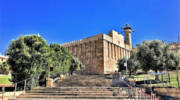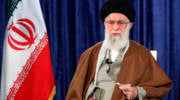
Famous 11th-century Jewish philosopher Maimonides taught that the highest form of charity is to help a fellow human being find a means of self-support rather than living on donations. Rabbi Yosef Zvi Rimon, this week’s choice for the “Faces of Israel” feature, embodies this principle and has helped thousands to get back on their feet.
Rabbi Yosef Zvi Rimon, a renowned authority on halacha (Jewish law), brilliant educator, prolific author and favored lecturer, has a golden heart. The combination of his profound intellect and deep compassion for others has resulted in successful employment initiatives that transformed the lives of countless individuals who had thought their situations hopeless.
Rabbi Rimon is founder and chairman of the Halacha Education Center, which develops innovative curricula for Jewish studies in Israel and abroad using cutting-edge technology. He is an internationally recognized posek – a scholar who makes decisions in Jewish law in areas where previous authorities were inconclusive or in situations where no precedent exists.
In 2008, Rabbi Rimon was awarded the President’s Prize for Volunteerism by President Shimon Peres. Apparently his exceptionalism is a family trait; his grandfather – late author and poet Yosef Zvi Rimon, after whom he was named – was given the same prize 50 years earlier by then-President Yitzhak Ben-Zvi.
On May 29, Rabbi Rimon will receive the prestigious Moskowitz Prize for Zionism on Jerusalem Day (the anniversary of the liberation of Jerusalem in 1967) in recognition of his work on behalf of the Israelis who, in 2005, were forced out of Gush Katif – thriving Jewish agricultural communities in Gaza that they had developed from scratch.
The unilateral disengagement from Gaza was economically disastrous to thousands of families. Many breadwinners, including men and women over the age of 50, had been farming the land for decades and had no other means of livelihood.
Job Katif Helped 2,400 Families to Date
Immediately after the disengagement, many of these families were taken temporarily to hotels and other centers, where compassionate supporters checked to see how they could help, and Rabbi Rimon was among them. The urgent need for employment was obvious.
He immediately established Job Katif; since then, more than 2,400 families have found work thanks to his efforts.
In an interview with United with Israel, Rabbi Rimon explained how he managed to play such a pivotal role, considering the fact that he was not a trained employment counselor. How was he of greater assistance than professionals in the field?
“I approached it as I would approach a Talmudic concept,” he replied. “What was the problem? I analyzed it and I looked for answers.”
Assisted by 150 volunteers from across the country, he did it “mostly with a lot of love and a lot of help from God.”
He told himself: “If you don’t help them now, maybe in a year the damage will be so great that you won’t be able to fix it.”
Rabbi Rimon has similarly helped other communities, including Ethiopian immigrants and people from developmental towns. Many individuals from diverse demographic backgrounds “somewhere along the way got stuck,” he said. “This includes professional, talented, qualified people. Some are new immigrants.”
“We now have a system to work with them,” he explained. “They say that after eight months of not working, you might never be able to work again. We don’t give up on anyone. People who thought they would never find employment again – some were out of work for years – are now employed. What is important is to help them gain confidence. We help them find work, but first they need to have confidence in their abilities.”
Hearing positive feedback is often a moving experience. For example, “after addressing a youth program, a 16-year-old girl came over to me and said, ‘Thank you for saving my family.'”
Born in Tel Aviv in 1968, Rabbi Rimon also served in the IDF. He lives in Alon Shvut (in Gush Etzion), where he serves as the community rabbi, with his wife and eight daughters.
Author: Atara Beck, Senior Writer, United with Israel
Do You Love Israel? Make a Donation - Show Your Support!
Donate to vital charities that help protect Israeli citizens and inspire millions around the world to support Israel too!
Now more than ever, Israel needs your help to fight and win the war -- including on the battlefield of public opinion.
Antisemitism, anti-Israel bias and boycotts are out of control. Israel's enemies are inciting terror and violence against innocent Israelis and Jews around the world. Help us fight back!






















